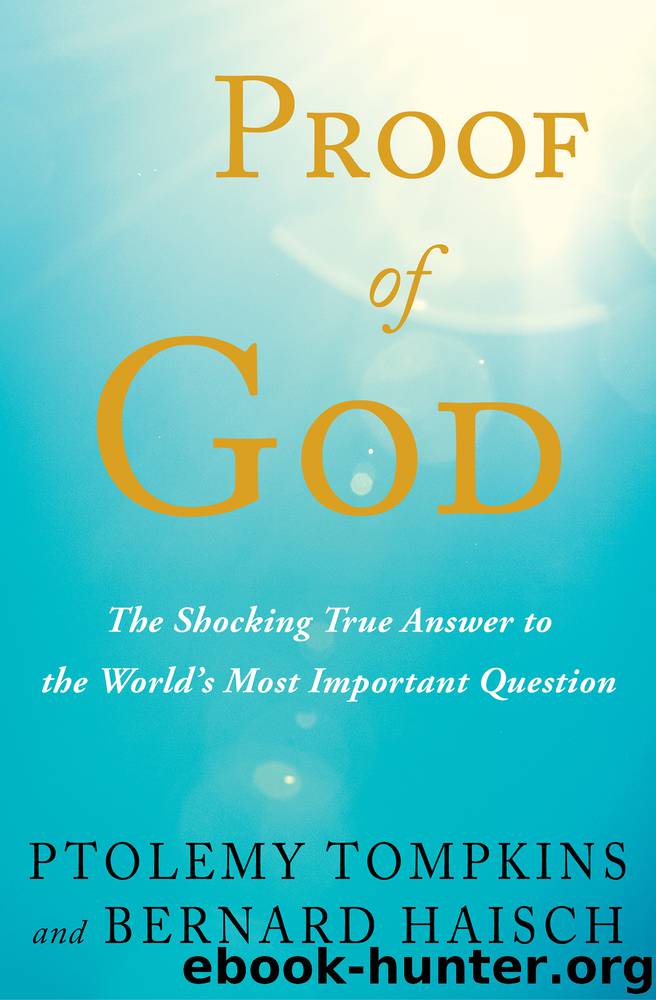Proof of God by Ptolemy Tompkins

Author:Ptolemy Tompkins
Language: eng
Format: epub
Publisher: Howard Books
CHAPTER 10
Consciousness
WITH THE WORD “consciousness” introduced into the conversation, I suddenly realized why our morning talk had got me thinking about my days at Guideposts, with our modern world’s obsession with fame, and with that feeling of fleeting reality that I believed so many people in the modern world suffered from.
I also realized that with it, we had stepped to the very center of what our discussions had been moving toward from the very beginning.
“Consciousness” is a notoriously hard word to define, but one simple—and accurate—way to do so is to substitute another word for it: thought.
The word “thought” took on new significance when the seventeenth-century philosopher and scientist René Descartes used it in what is perhaps the single most famous philosophical statement in history.
This sentence, Cogito ergo sum, is usually translated as “I think, therefore I am.” It’s one that most people remember from school no matter how little contact with Philosophy classes they may have had.
Though Descartes first formulated this sentence in Latin, he introduced it to the world in 1644 in his native French as Je pense, donc je suis. But whatever language this sentence is spoken in, its meaning remains clear: the fact that we think is evidence—incontrovertible evidence—that we exist.
Thinking, said Descartes, is the one and only thing, in a world where we must greet everything we see with doubt and a demand for proof, that does not require proof. It does not require proof because it is self-evident. No one can doubt that he or she thinks—that he or she is conscious. This is, said Descartes, the one unqualified truth that we can know—the one fact that is evident without any need of experiment.
But a closer look at Descartes’s famous declaration reveals another message: to arrive at truth, we must separate our minds from everything else in the universe.
Descartes, in short, is the father of our distinctly modern way of looking at the world: as a collection of material objects that we can isolate, measure, perform experiments on, and just generally treat as separate objects; objects having nothing to do with the thinking, watching, manipulating selves that are performing all these experiments.
For Descartes, the division between the out there world of objects and the in here world of thought was firm. This division in essence launched modern science, for it freed scientists to measure, weigh, kill, dissect, experiment on, and just basically do whatever it wanted to the world and all the things, be they living or dead, within it.
In the world before Descartes, objects could be loaded down with all kinds of invisible yet real qualities. A holy relic preserved in a church was holy not just because it had, at some point in the past, been associated with a sacred event. That holiness lived, as a very real power, within that object itself.
Not so after Descartes. By dividing the world into “inner” and “outer,” he robbed the outer world not just of its holiness, but of all qualities, from large to small.
Before Descartes came along, the world was full of qualities.
Download
This site does not store any files on its server. We only index and link to content provided by other sites. Please contact the content providers to delete copyright contents if any and email us, we'll remove relevant links or contents immediately.
The Complete Stick Figure Physics Tutorials by Allen Sarah(7339)
Secrets of Antigravity Propulsion: Tesla, UFOs, and Classified Aerospace Technology by Ph.D. Paul A. Laviolette(5336)
Thing Explainer by Randall Munroe(3911)
The River of Consciousness by Oliver Sacks(3574)
The Order of Time by Carlo Rovelli(3164)
How To by Randall Munroe(3077)
A Brief History of Time by Stephen Hawking(2994)
I Live in the Future & Here's How It Works by Nick Bilton(2963)
What If?: Serious Scientific Answers to Absurd Hypothetical Questions by Randall Munroe(2670)
The Great Unknown by Marcus du Sautoy(2664)
Midnight in Chernobyl by Adam Higginbotham(2519)
Blockchain: Ultimate Step By Step Guide To Understanding Blockchain Technology, Bitcoin Creation, and the future of Money (Novice to Expert) by Keizer Söze(2467)
Networks: An Introduction by Newman Mark(2383)
The Meaning of it All by Richard Feynman(2320)
Easy Electronics by Charles Platt(2309)
The Tao of Physics by Fritjof Capra(2247)
Midnight in Chernobyl: The Untold Story of the World's Greatest Nuclear Disaster by Adam Higginbotham(2200)
When by Daniel H Pink(2098)
Introducing Relativity by Bruce Bassett(2097)
